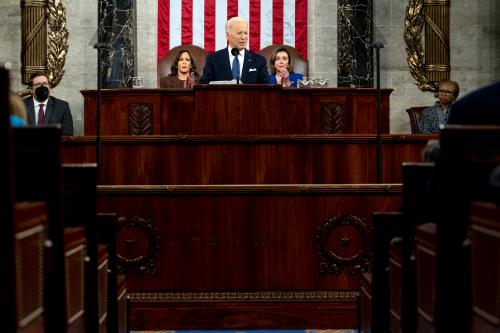“President Obama exempted Congress from the Affordable Care Act (Obamacare)!” is a popular talking point heralded by health reform opponents. This talking point seeks to vilify federal employees who have already faced a difficult year. Many saw summer furloughs or threats of furlough. Budgets, after being cut, have been in flux and now in a freeze. This Congressional exemption to Obamacare talking point is simply another way to attack the federal workforce, and like many talking points it is false.
To address this “exemption,” Senator Vitter (R-LA) has proposed an Amendment to legislation that would rewrite a small portion of the Affordable Care Act to scrap the “special exemption.”
So, let’s review the facts of how the law treats Congressional staff under the Affordable Care Act, the Vitter Amendment, and what its consequences are for governance and the federal workforce.
The Myth of the “Exemption”
David Vitter is right. Congressional staffers are treated differently under the Affordable Care Act. Unlike all other large employers in the United States, Congress is specifically banned from maintaining its current healthcare plan. Large employers (as defined under ACA as companies that maintain 50 or more full time workers) face a penalty if they remove employees’ health care benefits. Under a provision of ACA, Congressmen and their staffs are required to purchase health care from Exchanges.
This unique treatment is not the cause of ire among opponents of ACA, however. The controversy over the “exemption” comes from a proposed regulation from the Office of Personnel Management (OPM) in August. The regulation is quite clear. It notes that the Affordable Care Act requires all Members of Congress and staff to purchase health care on the Exchanges, per the amendment to the original law. However, ACA is silent about the employer contribution that Congress and staff currently receive.
Like most employees (public and private), Congressional staff who receive health care from their current plan (Federal Employees Health Benefits Program) pay part of their premium. The remainder is paid by their employer: the U.S. Congress. The employer contribution is a standard part of employer-provided health care plans in the United States—affecting a majority of Americans. OPM does note that Congress failed to remove the provision of law outlining the employer contribution. As a result, current law requires Congress to maintain the employer contribution for “all health benefits plans fitting within the definition set forth in [5 U.S.C.] 8901(6)” (see OPM regulation RIN #3206-AM85).
OPM argues that Congress, in designing the Affordable Care Act had the opportunity to nix the employer contribution, but it did not. OPM, as a result, must issue regulations consistent with the law. ACA in conjunction with current law (5 U.S.C. 8901) defines healthcare coverage for Congress and its staff. The result? Congress must purchase insurance on exchanges (per ACA) and must provide the employer contribution (per 5 U.S.C. 8901).
The irony: Congress is treated as a unique entity, not because it is exempted from the Affordable Care Act, but because it is the only large employer forced onto its Exchanges.
The Vitter Amendment: The Facts and Background
Senator David Vitter (R-LA) has sought a legislative solution to the OPM regulation, clarifying the law to be consistent with what he sees as a fair bargain. The solution is to extend the provisions forcing Congress and staff onto the Exchanges to the “President, the Vice President, and political appointees” (Vitter Amendment to S. 761).
The Vitter Amendment also removes the employer contribution that the OPM regulation maintains. The Amendment notes, “No Government contribution under section 8906 of title 5, United States Code, shall be provided on behalf of an individual who is a Member of Congress, a congressional staff member, the President, the Vice President, or a political appointees (sic) for coverage under this paragraph.”
Essentially, the Amendment expands the group required to purchase insurance on the Exchanges while removing a key benefit: the employer contribution. What is most remarkable is that the Vitter Amendment is loosely based on Sen. Grassley’s Health Reform Accountability Act of 2010, except the Grassley bill provided for the employer contribution to be maintained and issued to health plans on the Exchange.
The Vitter Amendment: The Consequences
The Vitter Amendment can have serious, negative effects on government—particularly the federal workforce.
First, the bill affects higher paid, more experienced Congressional staff. These individuals serve on Congressional staffs because of a call to public service, the appeal of benefits, or the excitement of the work—often despite higher paying job opportunities in the private sector. Are their salaries above average? Absolutely. Are they doing top quality work in an institution that needs all the help it can get? Yes! The cut in the employer contribution may incentivize some of the more experienced talent on Congressional staffs to exit public service. This loss of experienced, quality staff is the absolute wrong way to improve government.
Second and more painfully, the burden of the Vitter Amendment falls on the shoulders of junior staff. This topic receives little attention, but deserves the most. Junior staffers—staff assistants, legislative coordinators, etc.—are paid the least and have fewer alternative employment options, when compared to their senior colleagues. They are hardworking individuals who often spend their days dealing with angry constituents. The Vitter Amendment targets this group the most. Unlike others who work for large employers they will receive no employer contribution for health care.
Will these employees be able to get affordable health care on the Exchanges? Yes. However, they will be excluded from something millions of Americans enjoy: the employer contribution. In the end, budget debates and their associated political antics have victims. Often times, the federal workforce and government efficiency suffer the most.



Commentary
Congress, the Affordable Care Act, and the Myth of the ‘Exemption’
October 4, 2013